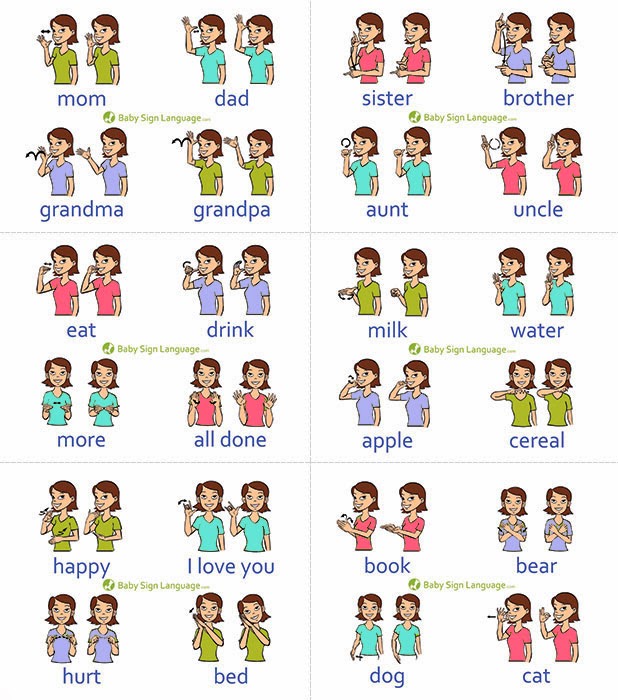Before babies can even coordinate their lips, tongues, and voices to speak, they understand what is spoken to them. During their development, they learn the meaning of some words before they have the physical ability to voice them. Just because they cannot verbalize it, though, doesn't mean they can't somehow convey it. Teaching your infant simple ways to state their needs via an easily recognizable platform of signs can do wonders for their speech development.
Longitudinal psychological studies on infants have suggested that teaching an infant to sign before they can speak not only helps them learn to talk, but offers them advantages even later in life. Dr. Linda Acredolo and Dr. Susan Goodwyn compared two groups of children: a group taught to sign early in life to a group never taught to sign.
This longitudinal research showed that children who were taught to sign as babies were talking at a 4-year-old level at just 3 years of age. The study also showed that the group of children taught to sign as babies scored higher on intelligence tests later in life than those never taught to sign. At 8 years of age, children taught to sign as babies scored an average of 12 points higher on intelligence tests than children never taught to sign. Additionally, the babies who were taught to sign displayed less aggressive tendencies, were less frustrated and more self-confident.
Perhaps this is because at any early age, they learned to express their needs and wants to their authority figures by merely using their hands (while they had not yet learned to verbally express their needs and wants). From a general standpoint, teaching an infant to sign at an early age promoted positive emotional development. Several follow up studies confirmed the same results: more advanced language skills, higher scores on intelligence tests, increased self-confidence, decreased frustration, and more positive interactions with parents and other infants (Acredolo and Goodwyn, 2000).
Extremely interesting right? There seems to be a "domino effect" taking place in this particular study, in my opinion. I think the effect of a more "positive emotional development" is simply a cause of an ability to express one's needs without the frustration that comes along with first learning to speak. But how is higher scores on intelligence tests an effect of early signing? Perhaps signing aids children in the conceptualization of phrases and their meanings, and this early exposure to "conceptualizing" becomes an academic aid later in life. One thing's for sure: there's no harm in teaching a baby to sign their needs, only benefits.
So where and when do you begin? Again, most babies understand simple words before they are able to say them. The motor functions of their lips, tongue, and mouth have yet to develop, and how frustrating must that be when you really want to say something. When it seems your infant can understand your words, it's time to teach them simple baby sign language. Start with words or phrases that are most motivating to the child. For example, teach them to sign the names of things (if you have a pet, teach them to sign "dog"; buckling your child in, teach them to sign "car"). Names of people, such as "Mommy" or "Grandpa" can be good starting points. Children are motivated to get attention. Teaching a baby to sign ownership ("mine") can also be a great starting point, because most babies are extremely materialistic toy hoarders. Think about your baby's most prevalant needs. Teach them to sign words that are important to them such as eat, hungry, more, milk, bathroom, hurt, play, toy, and even thank you.
Of course, while you teach them to sign, teach them to speak. Acknowledge a heavier understanding of their speach (when they're first learning to speak) so they understand that verbal communcation is a better way of expressing their needs than signing. Associate spoken word with hand gestures always when teaching them to sign. Teaching an infant with healthy hearing development to sign before they can speak is proven advantageous, so you've got nothing to lose. Here are some great gestures to start with:

Resources
Garcia, J. (2001). Which signs to start with and when to start. Sign with Your Baby: How to communicate with infants before they can speak (p. 31). Seattle, WA: Sign 2 Me and Bellingham, WAL Stratton Kehl Publications, inc.
Goodwyn, S.W., Acredolo, L.P., & Brown, C. (2000). Impact of symbolic gesturing on early language development. Journal of Nonverbal Behavior. 24, 81-103
Wow, it is a very nice blog. This is very informative for me. I also look for a Speech Therapy in Long Island . Your blog is helping me very much.
ReplyDelete